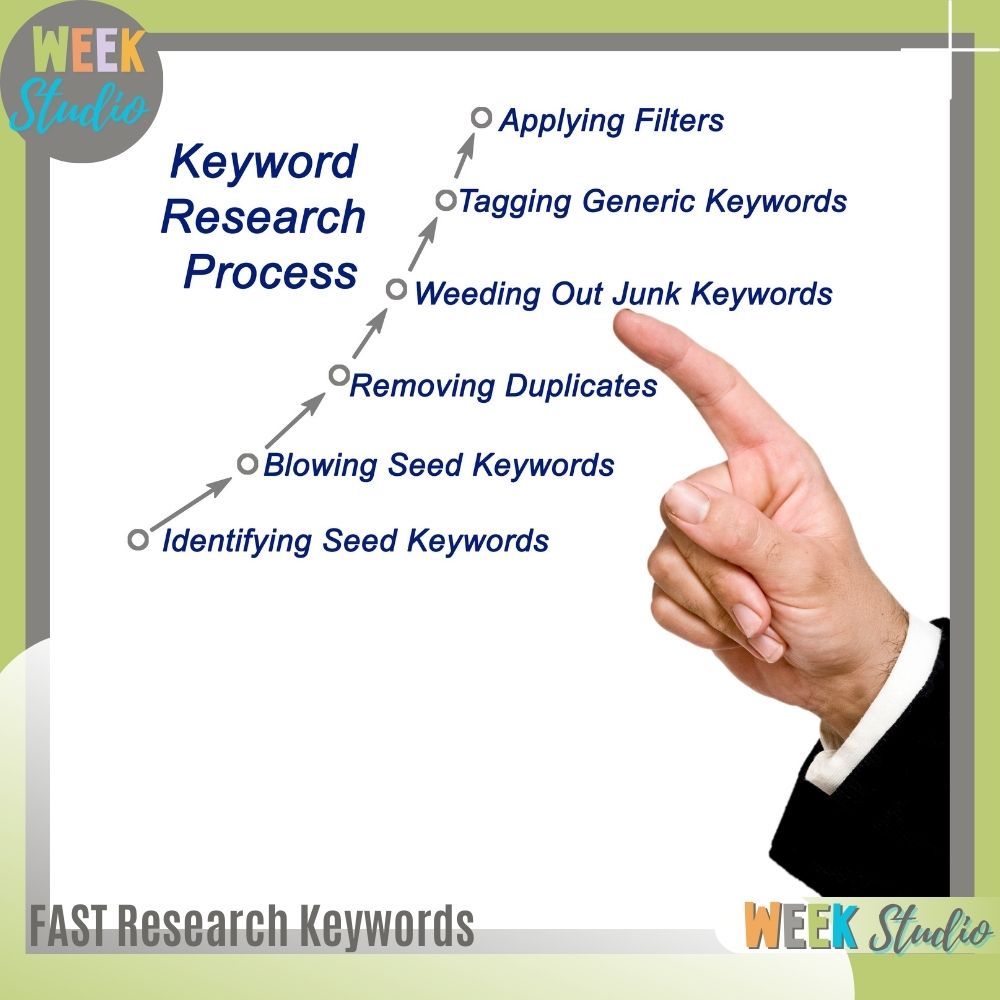Keywords are an integral part of any successful online marketing strategy. They help drive organic traffic to your website, improve your search engine rankings, and ultimately boost your business’s visibility and profitability. However, keyword research can be a time-consuming task, especially if you don’t have the right tools and techniques at your disposal. In this article, we will explore how you can research keywords quickly and efficiently, maximizing your chances of success in the digital world.
How Long Should Keyword Research Take?

There’s no one-size-fits-all answer to this question, as the amount of time required for effective keyword research will vary depending on your business, its goals, and the industry you’re operating in. However, as a general rule, you should allow for at least a few weeks of dedicated research before you start to see results.
The first step in any effective keyword research campaign is to come up with a list of potential keywords and phrases that your business could target. This can be done through a variety of methods, including competitor research, search engine trends, and brainstorming.
Once you have a good list of keywords, the next step is to start analyzing them to determine which ones are most relevant to your business. This can be done through a variety of methods, including search engine trends, competitor analysis, and search engine optimization (SEO) tools.
How Many Keywords Should Be There In 1,000 Words?

There is no definitive answer to this question, as the number of keywords that should be included in 1,000 words will vary depending on the topic, the audience, and the purpose of the content. However, as a general rule, you should aim to include around 2-3% of keywords in your content in order to optimize it for search engines. This means that for 1,000 words, you should aim to include 20-30 keywords.
Of course, you don’t want to simply stuff your content with keywords in order to meet this target. Keyword stuffing is a spammy technique that can get your content penalized by Google. Instead, you want to use your keywords naturally, sprinkling them throughout your content in a way that feels natural and relevant to your audience.
If you’re not sure how to do this, or you’re struggling to hit your target keyword density, consider using a tool like Google AdWords Keyword Planner or the Yoast SEO plugin for WordPress. These tools will help you find the right keywords to target, and will even give you a score for how well you’ve implemented them into your content.
How Many Times Should I Repeat A Keyword For Seo?

In general, the more times you can include a keyword or phrase in your content, the better. However, you also don’t want to overdo it to the point where your content becomes spammy or difficult to read.
Ideally, you should include your target keyword or phrase a few times throughout your content, including in the title, in the opening paragraph, and a couple of times throughout the rest of the article. You can also use variations of your keyword or phrase, as well as related keywords and phrases.
By using a variety of keyword techniques, you can help improve your site’s SEO and increase your chances of ranking higher in search engine results pages.
How Many Searches Is Good For A Keyword?
The answer to this question is a little more complicated than a simple number. The reason for this is that the answer depends on a number of factors, including what your goals are for your website and how competitive the keyword is.
In general, you want to aim for a keyword search volume of around 1,000-2,000 per month. However, if your goal is to make money from your website, you will want to target keywords with a higher search volume.
If you are just starting out, it is a good idea to target less competitive keywords. This will make it easier for you to rank higher in the search engines. As you gain more experience and grow your website, you can then start targeting more competitive keywords.
Is Keyword Research A Skill?
A skill is something that can be learned and improved upon with practice. Keyword research is definitely a skill that can be learned and improved upon. You can use tools like Google AdWords Keyword Planner and Moz’s Keyword Explorer, or you can use the Google search engine itself.No matter which method you choose, the most important thing is to be patient and keep track of your results.

Try different keywords and combinations and see which ones work best for you. Keyword research is a skill that can help you improve your website’s search engine rankings and increase your traffic. It’s important to learn how to do it correctly so that you can get the most benefit from your efforts. The most important thing is to find keywords that have a high search volume and low competition. This will help you get the most traffic from your efforts.
- The first method is to use the Google AdWords Keyword Planner. This tool is free to use and it allows you to see the search volume and competition for keywords. You can also use it to get ideas for new keywords.
- The second method is to use Google search results. This method involves looking at the top 10 search results for a particular keyword and analyzing the keywords that are used in the titles and descriptions.
- The third method is to use keyword research tools. There are a number of different tools available, including the Google AdWords Keyword Tool, the Google Insights for Search, and the semrush.com Keyword Research Tool.
These tools allow you to see the search volume and competition for keywords. They also allow you to see the related keywords and the number of searches for each keyword.
Understand Your Target Audience
Before you begin your keyword research, it’s crucial to have a clear understanding of your target audience. Who are they? What are their needs and pain points? By answering these questions, you can create a buyer persona that will guide your keyword research efforts.
Brainstorm Relevant Topics
Once you have a clear understanding of your target audience, brainstorm a list of relevant topics and subtopics related to your business. These can be general ideas or specific questions that your audience might have. For example, if you run a fitness blog, topics could include “healthy recipes,” “weight loss tips,” or “workout routines.” These topics will later serve as a starting point for generating keyword ideas.
Use Keyword Research Tools

Once you’ve selected your target keywords, it’s important to include them throughout your content in a way that’s both relevant and interesting to your audience. You can do this by using them in the title, in the body of the article, and in the metadata (e.g. the title tag and meta description).
You can also use keyword-rich headlines to attract more attention from people who are searching for information on those topics. For example, “5 Ways to Use Keyword Research to Boost Your SEO” is a more keyword-rich headline than “How to Do Keyword Research.” When you’re done writing your content, be sure to check it for spelling and grammar mistakes. Nothing ruins your hard work like a typo!
Analyze Competitor Keywords
Another effective way to discover keywords quickly is by analyzing your competitors’ keyword strategies. Identify your top competitors and analyze their websites and content. Look for keywords they are targeting and ranking for, as well as the gaps in their keyword strategies. This will give you valuable insights and inspiration for your own keyword research.
Long-tail Keywords
When researching keywords, don’t forget the power of long-tail keywords. These are longer, more specific phrases that have lower search volumes but often higher conversion rates. Long-tail keywords can help you target a niche audience and rank higher in search engine results pages (SERPs) with less competition. Tools like Google Autocomplete or Answer the Public can provide you with long-tail keyword ideas.
Consider User Intent
Understanding user intent is crucial when researching keywords. It’s not enough to find keywords that match your business; you need to identify the intent behind those keywords. Are users looking for information, looking to make a purchase, or seeking a specific solution? By aligning your content with user intent, you can ensure that you are targeting the right keywords and providing valuable content that meets users’ needs.
Group Keywords into Themes

To make your keyword research more organized and manageable, group your keywords into themes. Identify common topics or categories that emerge from your keyword list and group related keywords together. This will help you create content clusters or silos that are optimized for a specific theme, making it easier for search engines to understand and rank your content.
Prioritize Keywords
Not all keywords are created equal. Some have higher search volumes, while others have lower competition. To optimize your research, prioritize keywords based on their relevance, search volume, competition, and business goals. Focus on targeting keywords that have a good balance between search volume and competition, as these are more likely to drive organic traffic to your website.
Monitor and Refine
Keyword research is an ongoing process. As search trends and user behavior change, so should your keyword strategy. Continuously monitor your keyword performance using tools like Google Analytics or Search Console. Identify keywords that are driving traffic and conversions and identify any new keyword opportunities that arise. Refine your keyword strategy accordingly to stay ahead of the competition.
Conclusion
Your website’s visibility in search engine results pages (SERPs) is determined by a variety of factors, including the relevance of your content to users’ search queries, the number and quality of backlinks to your site, and the age and authority of your website. However, one of the most important factors is the keywords you target.
By understanding your target audience, using keyword research tools, analyzing competitor keywords, and considering user intent, you can research keywords quickly and efficiently. Remember to group keywords into themes, prioritize your keywords, and continuously monitor and refine your strategy. With these techniques, you can optimize your website’s visibility, attract more organic traffic, and ultimately achieve your business goals.
